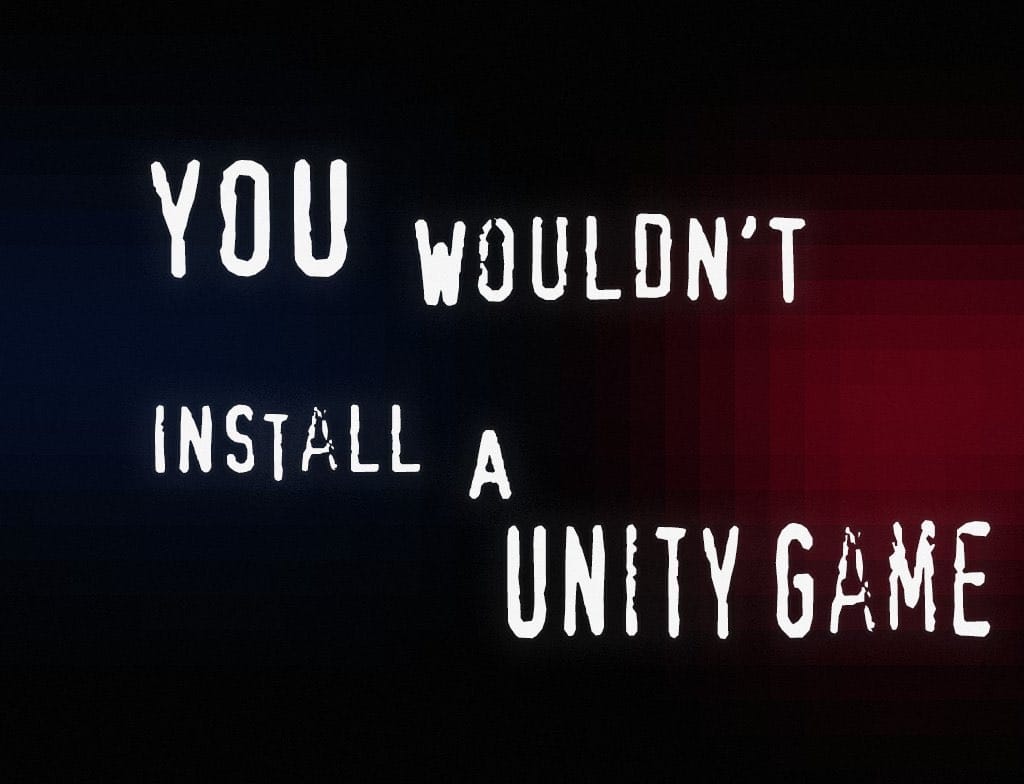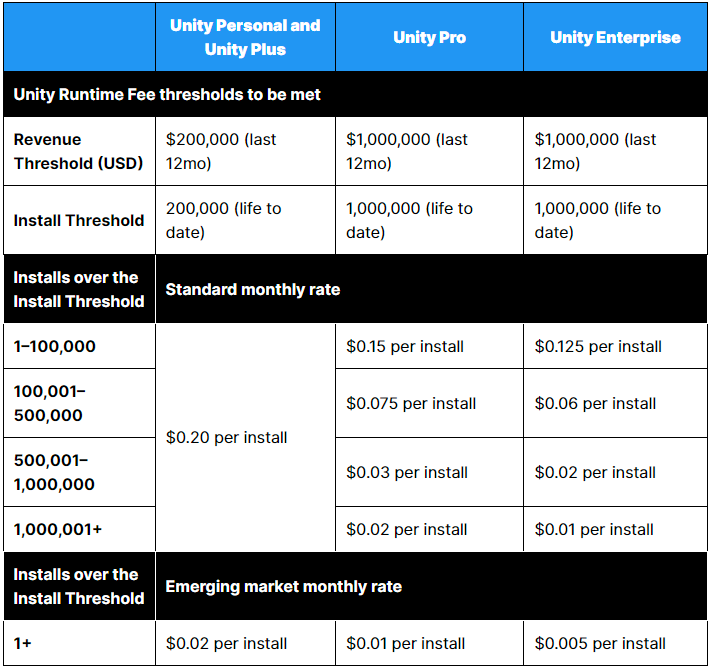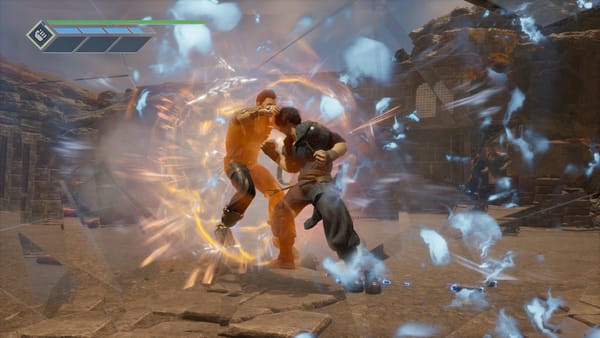#223: We must unite
Here comes Unity, with a reminder that there's no such thing as rock bottom.

I am sure that writing about this Unity business is a waste of time, because it is surely going to be humbly walked back upon within about two minutes of me hitting Send on today’s edition, if not before. Surely? Right? This is the dumbest, most destructive, and most wantonly self-harming change of strategy I have ever encountered in all my years playing, writing about, and generally following videogames. Hit Points is rarely surprised by anything in this industry, but I’ll be honest, this has knocked me for six. It appears I am far from alone.
If you have somehow missed the latest news, allow me to briefly catch you up. Yesterday Unity, maker of one of the (hitherto, I guess) most popular and affordable game engines on the planet, announced a new pricing policy. From January 1 the company will charge game makers what it calls the Unity Runtime Fee: a monthly charge for every new install of the game once it passes certain $200,000 in annual revenue and 200,000 lifetime installs, payable seemingly for the entire lifetime of the product, which as far as I can tell means ‘until the heat death of the universe’. Here’s a table, pulled from Unity’s blog post announcing the move.

This, by the way, is on top of the existing annual charge that Unity levies on each user. While Unity Personal is free, the hitherto most affordable tier, the $399 Unity Plus, is being taken out back and shot. The next tier up, Unity Pro, costs more than five times as much per user. Oh, and Unity Personal will now only be usable over an internet connection.
But it’s this per-install fee that’s really got people’s backs up, and it’s easy to see why. There is nothing in the economics of today’s game business that a per-install fee does not touch without seeming to completely ruin it — from charity bundles to demos, in-house testing to public betas, launch pricing to Steam sales, subscription services to piracy, review-code distribution, I could go on but you get the idea — whether your game is on console, PC or mobile, whether it is paid or free-to-play or some hybrid of the two. This is, quite simply, completely and utterly fucked from top to bottom. The developer community has been understandably eager to seek answers to the litany of seemingly very obvious problems with it to which Unity — at least at first — appeared to have no solutions to offer in response.
Unity has since ‘clarified’ (read: realised its error and changed its mind about) a couple of specific policy concerns. It says charity bundles will be exempt from the charge, though no one is entirely sure how, since all game keys are created equal. Demos will “mostly” not be chargeable, and fees will be levied per device, rather than per install; devs were understandably worried that the change would give rise to a new sort of hate campaign, where script kiddies could rapidly reinstall a game to bankrupt a developer they didn’t like. (This last claim is, at the time of writing, contradicted by an official post on Unity’s forum.)
It says developers will not be on the hook for, say, Game Pass installs, since the service provider will pay it rather than the developer. This sadly overlooks that, even if Microsoft agrees to pay the fee for however many of the 25m Game Pass subscribers download a game, it will pass that cost on, either to developers through reduced licensing terms, or customers through higher subscription fees. This is all very, very bad. Either Unity hasn’t thought this through at all, or it has and has decided to do it anyway. What a mess.
I understand, and am sympathetic to, the instinct to focus on the details of this disaster. But it is important to note, and for Unity to understand, that this is not solely a question of specifics. This is a holistic flavour of evil, a sort of equal-opportunity ruination. It scorches the whole earth, affecting anyone and everything that makes a game using the engine that achieves a modest level of success. It is retroactive, applying not just to games launching after the policy change comes into effect, but those that were already on the market as well (fees will only be chargeable for installs that occur after January 1). It is permanent: the developer of a Unity game will still be paying the engine maker for new installs when they are in the care home. And it is unknowable, since Unity can change the price of the levy at any time (and knowing Riccitiello as we do, this will happen fairly often, and it will only ever move in one direction).
This is the real kicker, I think. If you work in Unreal, you and Epic are forever bound by the terms of the EULA you signed up for at the time. With Unity, you are bound by whatever CEO John Riccitiello and his band of C-suite goobers feel like doing, hostage to the tanking share price of a company that seems increasingly incapable of making a good decision, or even communicating the bad ones effectively.
Moreover, in the context of today’s typical development timelines, the change is effectively immediate, and for many will be simply inescapable. The policy comes into effect in a little over three months. There are countless Unity games in development today whose budgets, staffing levels, project timelines and publishing contracts have been decided on a set of economics that no longer exist, and are too far along in the process to be able to change course. They woke up yesterday into a world where their first (hoped-for) million players will now cost them an extra $160,000 in fees. Today they are faced with an impossible choice: either suck it up, ship on Unity and pay the financial penalty; move to a higher per-seat package, where Runtime fees are lower; sign up for one of Unity’s sprawling suite of in-game advertising features, which promises (unspecified) lower fees; or delay the game by however long it will take to move it all to a different engine, with all the logistical and recruitment-related headaches that implies. Whichever way you slice it, Unity wins, and developers lose.
Riccitiello, one imagines, knows this full well, and I am quite sure he slept like a baby last night. This, lest we forget, is the man who as EA CEO floated the idea of realtime in-game microtransactions because “when you are six hours into playing Battlefield and you run out of ammo, and we ask you for a dollar to reload… you’re really not very price-sensitive at that point in time.” He knows there is nothing developers can meaningfully do about this without shooting themselves in the foot, possibly fatally. Players are helpless too: a boycott would merely send countless studios to the wall, with minimal impact on him and his wrecking crew of shakedown artists.
Our only hope, as far as I see it, is the platform holders — Microsoft, Sony, Nintendo, Apple, Valve and so on — who will be on the hook for tens of millions of dollars a year as a result of Unity’s clever new fee structure, and I imagine are less than happy about it (particularly Epic!). Hit Points has readers at all of those companies, many of them in high-level positions. I urge you to do whatever you can to ensure your executive leadership push back at this in a language Riccitiello might understand, and actually listen to. The developers you say you value so much are in desperate need of your help.
MORE!
- Bloomberg’s had a little dig into Square Enix’s recent woes, which have led to the publisher’s share price falling 30% since the release of Final Fantasy XVI. Anonymous current and former staff take issue with Square’s producer-led approach, which sees high-profile individuals “given full reign over the scope and direction of projects.” Contractors speak of “an ad-hoc process where project goals can shift without warning.” I kind of see where this is coming from, but when the only really good things to happen to Square Enix in recent years have been helmed, in quite singular, closely controlled ways, by Naoki Yoshida and Yoko Taro, I can understand the appeal of the fiefdom approach. For my money Square’s problem is picking the wrong projects, rather than executing badly on good ideas. Miyamoto himself would have struggled to make a good game out of Forspoken, for instance. Ho hum.
- While all this Unity business was kicking off yesterday, Apple unveiled iPhone 15. Hit Points does not normally pay much attention to these things unless it has an upgrade due, but is happy to make an exception in this instance since the Pro model signals a deeper push into games with support for hardware-accelerated ray-tracing (!) and ports of console/PC titles including Resident Evil 4 Remake and Assassin’s Creed: This Year’s Subtitle. Very nice. Apple pals, do get in touch. Quite fancy having a look at that.
- NBA 2K24 launched last week, and has already become the second-worst-reviewed game of all time on Steam. In addition to the microtransaction-based stink that follows the series everywhere it goes, players are upset that the PC version continues to use the last-gen version of the game’s engine, and thus is absent many of the fancy bells and whistles available on PS5 and Xbox.
- There’s a Nintendo Direct tomorrow. You may now celebrate.
- Donald Mustard, chief creative officer at Epic Games, is retiring. Mustard co-founded Chair Entertainment, maker of Shadow Complex and early iPhone showcase Infinity Blade, in 2005 before flogging it to Epic three years later; he was appointed CCO in 2016, and has since overseen the meteoric success of Fortnite. He is retiring aged 47, which is just two years older than me and, if you don’t mind, I am going to have myself a little lie down and think about that for a while.
That’ll do, he typed through the tears. Paid subs, I’ll see you again later this week. If the rest of you would like to join us, a paid subscription costs just £4 per month, unlocks exclusive posts and the full archive, and if enough of you pay up may mean I get to retire before my vital organs give out. Cheerio!





